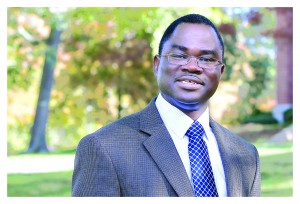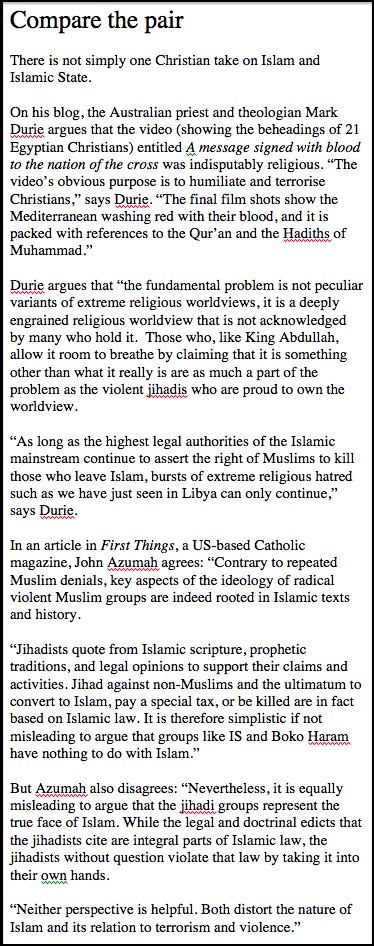John Azumah is Associate Professor of World Christianity and Islam at Colombia Theological Seminary in the United States. He specialises in Islam and Christian-Muslim relations. He grew up in a Christian family and converted to Christianity at age 17.
Even a cursory look at the news headlines from the last few months makes us sad, angry and fearful. From the Charlie Hebdo massacre, to Boko Haram in Northern Nigeria, to the Sydney siege, to the university attack in Garissa, Kenya, to the heinous acts of Islamic State across the Middle East, it feels like the world is burning and that we are helpless in the face of it. It has been easy for people in the West to develop a deep-seated hatred of Islam and all it stands for.
Dr John Azumah is a Professor of World Christianity and Islam at Columbia Theological Seminary in the U.S. He spent a few weeks in Australia in January, speaking at the Church Missionary Society’s annual conferences around the country about the five faces of Islam, responding to Islam, and witnessing to Muslims.
According to Azumah these five faces are:
- The missional face—the face that seeks to convert the world to Islam.
- The mystical face—the face that focuses more on spiritual things.
- The ideological (political) face—the face that seeks to occupy the public sphere, by implementing sharia (or Islamic) law.
- The militant face—this is the face of Islam that seeks to achieve its ends by the use of violence.
- The progressive face—this face is usually self-critical, and seek to reread the Koran in light of present realities.
These groups don’t stand in isolation from one another. Instead, they are more like concentric circles, randomly overlapping at various points. Each Muslim person is likely a unique combination of different aspects of some of these five faces.
But they also cannot be lumped together under one big heading of “Islam”. To speak of Islam as a single monolithic entity is to miss the point entirely.
Azumah grew up as a Muslim, in a Muslim family and converted to Christianity during his school years. As he tells it, he became a Christian because someone called Thomas “lived the gospel before him”.
Speaking to Dominic Steele on Sydney’s 2CH later that week, he said “The Christians [in my school] really impacted and challenged me with the Christian lifestyle. I began to go the Bible studies and Bible school. I started reading the Bible like I would have read the Koran. I tried to memorise as much of the Bible as I could. That is how my love, deep affection and commitment to Jesus grew in the Christian faith.”
This is one of the big themes of his message: “you can’t argue people into a relationship with God, you’ve got to win them. More people have been brought into the church by the kindness of Christian love than by all the theological arguments in the world.
“One of our greatest omissions from the Great Commission is the Muslim world. This is a mission field. This is a gospel poor people. These 1.6 billion people we are talking about—they are a face of Islam. The most important face. They are people. They are human beings. They have names. They have fears. They have anxieties. But above all, they are created in the image of God.”
When we lose sight of the Great Commission, Azumah says we let ourselves “get distracted from the one mandate Christ left with the church: to be his witnesses. Whatever we do in this [modern] context we should not lose sight of the fact that we have been called to witness.”
“When we look around, it is scary. We are right to be angry. But we cannot allow the fear and the prejudices to hold us back from the command Jesus gave us.” In this moment Azumah is urging us—his fellow Christians—to remember the Great Commission.
As a witness to Jesus, Azumah confesses that too often he feels like he is “forced to choose between hating Islam and loving Jesus. But,” he says, “hating Islam is not part of my confession. It’s not part of my creed.
Azumah identified radical Islam—one of the five faces of Islam—as the branch that wants to build walls to separate people. It seeks to sow hate and fear. He says, “if we fall into the bait of us vs. them, then we are doing their work for them. We are helping them build their walls and sow their hatred and fear.” Azumah says, “I don’t want to help them do that”.
It is the responsibility of Christians to be very wise in reacting. Azumah says, “we must not react in fear. Not in hatred. Not militantly. We need to be careful that radical Islam does not radicalise us.
“During difficult times foolish people build walls,” says Azumah, “and wise people build bridges. My hope is that we have many more people who’ll be willing to build bridges”.
Email This Story
Why not send this to a friend?




